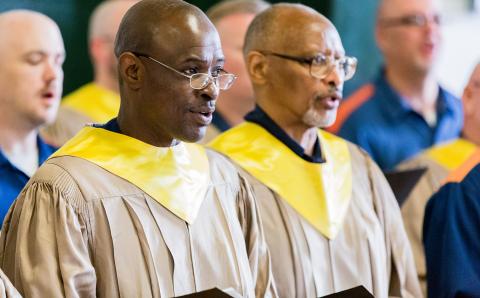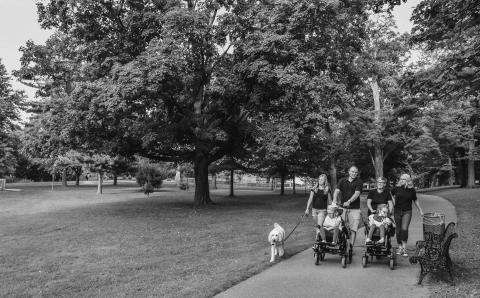“Remember those in prison as if you were bound with them, and those who are mistreated as if you were suffering with them” (Heb. 13:3, Berean Study Bible).
These are weighty instructions. If we are honest, remembering those incarcerated as if we were bound with them is an instruction many of us would rather forget. When we do remember, we hope someone else will do it. But that’s not what God has asked.
As each of us considers how to live out this instruction in one’s own life, we have several great examples from which to learn. Calvin Theological Seminary and Calvin University, for example, provide undergraduate courses that help inmates at a Michigan prison earn a degree. The stories of those who have participated in this program are powerful, and not just for those behind bars. My brother-in-law, though now retired from Calvin, continues teaching in the prison because of the benefits it brings him.
Crossroads Prison Ministry is another way many Christians from a variety of denominations live out this command. In 19 different countries, Crossroads prompts believers via correspondence to build relationships with those in prison so they can study the Bible together. Combined, they reach about 30,000 prisoners each year with a library of 12 Bible study courses.
In my own church, Larry and Marianne Tanis started ministering in prisons in the late 1980s. Today they are part of a worship team that leads services once or twice a month in the Brooks Correctional Facility in Muskegon, Mich. Marianne teaches drawing and painting to inmates each Monday and Thursday. Their involvement also led them to raise funds for the eventual building of a chapel on the prison grounds.
Here’s what they say about their involvement:
- We don’t go into prisons to bring God to the prisoners; God is already there. We go to prisons because God has asked us to meet God there, and when we do that, we and the prisoners are blessed and experience God’s love as we serve each other and worship God together.
- God has equipped us for this throughout the years and has helped us to see what God sees. He sees broken lives that need him, that have been banished from society to a place they cannot leave, where few will come to visit, and where those who live there feel they have been forgotten. God uses those who spend time there to open up these lives.
- There is nothing like experiencing the response people at the bottom of their lives have to a song or sermon in a worship service, or to a newfound understanding of being able to express themselves through a drawing or painting they have done. As they worship and as they create, God reveals new things to them about God and their own lives.
What an amazing testimony this is! And being bound to prisoners does not end when they are no longer behind bars. Think about the many ways those released from prison need your support and encouragement once they return to your communities. This includes Sundays and every other day of the week. For a great example, see the video at crcna.org/OurJourney/church-and-community.
I believe we also have a responsibility to think about the ways all of us can help prevent people from ending up in prison. This includes coming alongside vulnerable populations, mentoring people, and seeking to make the criminal justice systems in Canada and in the United States places that truly reflect the call of Amos: “But let justice roll down like waters, and righteousness like an ever-flowing stream” (Amos 5:24, NRSV).
Consider the gifts and opportunities God has given you. How is God calling you to remember prisoners as if you were bound to them and suffering with them?
About the Author
Steven Timmermans served as the executive director of the Christian Reformed Church in North America from 2014 to 2020.
Steven Timmermans se desempeñó como director ejecutivo de la Iglesia Cristiana Reformada en América del Norte de 2014 a 2020.
Steven Timmermans는 2014 년부터 2020 년까지 북미에서 기독교 개혁 교회의 집행 이사로 재직했습니다.








